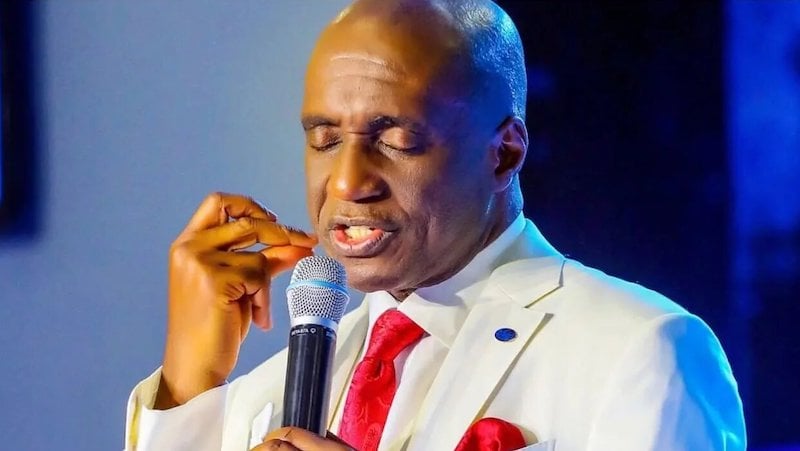When Pastor David Ibiyeomie recently declared that “God does not associate with the poor,” he did not just stir controversy, he exposed a deeper, more dangerous rot at the heart of modern Nigerian Christendom: the unholy marriage between faith and materialism. His words were not merely a slip of the tongue; they are a symptom of a larger theological disease that has infected Nigerian pulpits and misled millions.
This prosperity gospel, an ideology that equates divine favor with financial wealth, has grown into a monster with tentacles stretching into every corner of Nigerian religious life. It promises heaven in exchange for offerings and tithes, measures faith by the size of one’s bank account, and portrays poverty as evidence of spiritual failure. Pastor Ibiyeomie’s comments are not isolated; they echo the ideology peddled by many influential pastors whose doctrines are more about stock market dividends than the kingdom of God.
Before delving into the broader implications, let us be guided by having it at the back of our minds that the Bible is littered with evidence of God’s preferential option for the poor: “Blessed are the poor in spirit, for theirs is the kingdom of heaven.” Matthew 5:3, “This poor man cried, and the Lord heard him, and saved him out of all his troubles.” Psalm 34:6, “Has not God chosen those who are poor in the eyes of the world to be rich in faith?” James 2:5
The consistent thread throughout Scripture is clear: God is near to the brokenhearted and poor. The Old Testament prophets were vocal about justice for the poor. Jesus Christ, the founder of our faith, was born in a manger and lived with no material wealth. The apostles suffered, were persecuted, and carried no bags of silver.
In fact, to claim that God distances Himself from the poor is to rewrite the gospel in the image of mammon. In Nigeria, the prosperity gospel has taken root in a society plagued by economic hardship. It manipulates the desperation of the masses. It feeds on their hunger for hope. But instead of pointing them to Christ, it redirects their gaze to earthly riches. In this twisted doctrine, a full wallet is proof of faith, and a struggling life is a mark of spiritual laziness.
Worse still, prosperity preaching places the burden of blessing solely on the believer. If you are poor, it is because you have not prayed hard enough, fasted long enough, or sowed a big enough seed. The preacher becomes the gatekeeper to God’s favor, and the church turns into a marketplace where miracles are for sale.
Another toxic by-product of prosperity preaching is the rise of the celebrity pastor. These men and women brand themselves as proof of their own message. Their luxury cars, mansions, designer suits, and private jets become testimonies of their “anointing.”
The danger in this is not just theological, it is psychological and sociological. It turns churches into personality cults. Followers become loyal not to Christ, but to the pastor who promises breakthrough. Questioning the preacher becomes tantamount to blasphemy. In this environment, accountability dies and spiritual manipulation thrives.
Bluntly put, the true gospel is not transactional. It is transformational. Jesus did not come to make us millionaires; He came to make us whole. He did not die so we could own property in Banana Island; He died so we could have eternal life. The early Church thrived in poverty, persecution, and simplicity. Their wealth was not measured in naira or dollars, but in love, fellowship, and truth. “Silver and gold have I none; but such as I have given I thee: In the name of Jesus Christ of Nazareth rise up and walk.” Acts 3:6, that is the gospel. A power that heals, restores, and redeems, not one that enriches a few while leaving the many disillusioned.
Let us be clear: Pastor Ibiyeomie is not the root of the problem. He is a prominent face of a much larger issue. The real problem is an entire ecosystem of preachers, churches, conferences, and Christian media that glamorize wealth while ignoring the weightier matters of mercy, justice, and faith.
From the mega crusades that charge gate fees, to the churches that prioritize building cathedrals over building character, Nigerian Christianity has been hijacked by materialism.
At this juncture, it is expedient to tell Nigerian pastors who have predilection to prosperity preaching that the poor are not cursed. To the struggling Christian reading this article: You are not cursed. Your empty bank account is not a reflection of your standing with God. Your pain is not punishment. You are not forgotten. “The Lord is close to the brokenhearted and saves those who are crushed in spirit”, according to Psalm 34:18.
God walks with the unemployed. He dines with the homeless. He sits with the downtrodden. The gospel is good news to the poor, not a rebuke against them.
At this juncture, it is expedient to opine that Nigerian Christianity needs a reformation. A return to the basics: Christ, the cross, and compassion. We need preachers who are more concerned with souls than with salaries. Churches that feed the hungry rather than fleece the flock. Sermons that comfort the afflicted instead of afflicting the comfortable.
We must stop measuring divine favor in material terms. The real blessing is knowing Christ and making Him known.
Pastor Ibiyeomie’s comment is more than a theological misfire; it is a warning. A red flag waving over a church culture that is veering off course. If we do not course-correct, we risk raising a generation that knows the pastor but not the Master.
At this juncture, permit this writer to pass a message to Nigerian prosperity preachers that they should always preach Christ, not cash, and that the people should seek truth, and not theatrics, and lastly to the poor that they are not beneath God as they at the very center of His heart.


